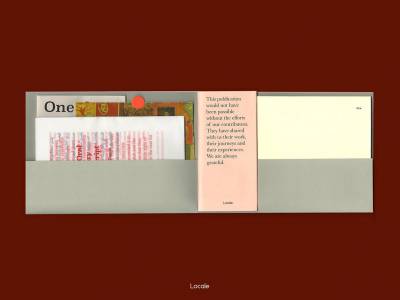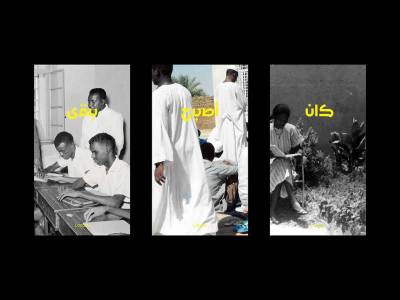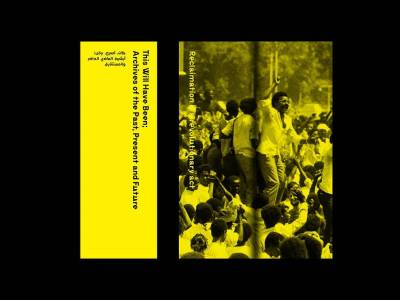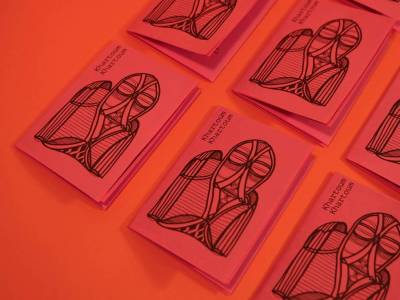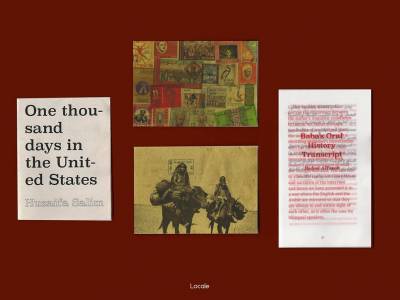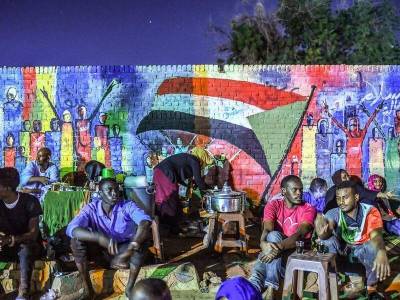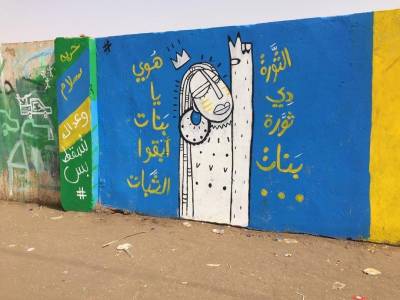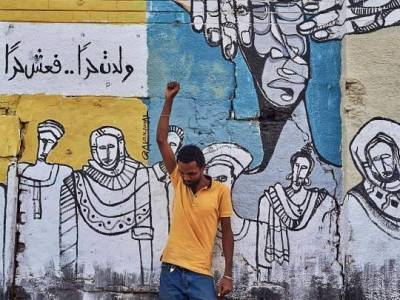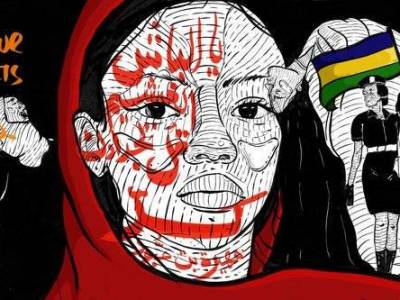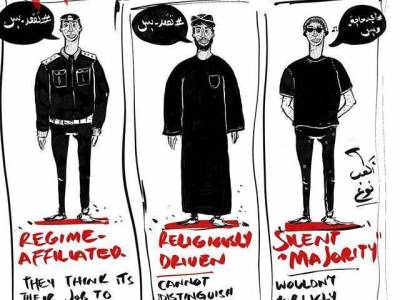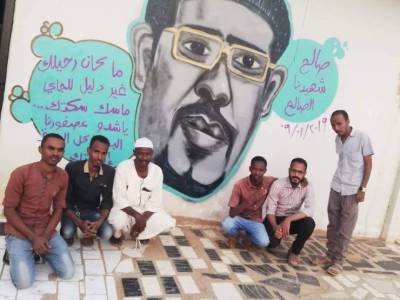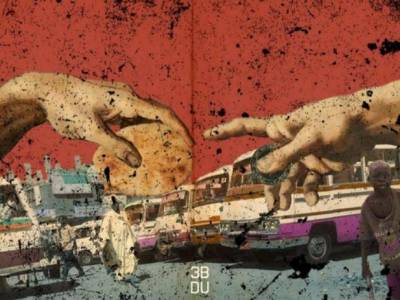Archiving Sudan’s Past, Present and Future
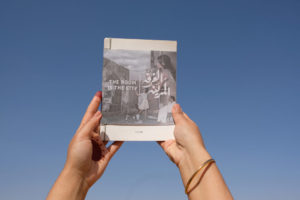
Sudan’s current popular uprising has triggered an avalanche of blue on social media. However, the majority of people outside the African country have no mental image of the diverse nation where the two Niles meet. Locale, a leading all female artist collective, is one of the institutions filling this gap since 2016 by combining visual and literary stories from Sudan in self-published zines and through online interactions.
In the midst of the Sudanese revolution many in Sudan’s cultural scene were excited about their latest project discussing archives, identities and visions for the future of Sudan. A few days before the planned launch the 2 month long pro-democracy sit-in was violently dispersed traumatizing the people of Sudan and its diaspora. The sheer violence with more than 120 confirmed deaths and unimaginable atrocities such as throwing people alive or dead in the Nile river numbed the people and seemed like too much to bare. Sudanese artists have documented and fueled the protests from the first day and were a vital part of the sit-in in Khartoum. The artistic expressions, deeply rooted in the moment and space in which they originate, represent the creativity of the Sudanese people to develop new tools for protest, as well creating a dialogue that is stronger and longer-lasting than the brutality of the ruling elite. Collective efforts have since begun to take care of and cope with the aftermath and to revive the non-violent protests. Slowly protestors filled the streets again. The resilience of the Sudanese people is remarkable and so are the artistic expressions accompanying the events. Locale has been continuously monitoring the situation online and has been actively involved in supporting the peaceful movement. Below my conversation with the four concerning their insight into the revolution and their engagement in it so far.
- What moved you to found your collective and how did you start working together?
“We are a group of friends that come from different backgrounds, but we had an interest and a passion for both the arts and for Sudan. We all live in different parts of the world, currently Qutouf, Safwa and Aala are based in the UAE, and Rund lives in KSA. We noticed that although there was a lot of creativity and a lot of creating within and around Sudan there was something missing, so we came together to create a space where like-minded people could find support and develop their own artistic and collaborative skills.”
- What are your main inspirations and sources for your work?
“There isn’t one source of inspiration for us, even more so because all of us are quite different in our interests, our approaches tend to be quite different. Also, our works are sometimes compilations done by artists around specific themes which allows them to be incredibly multifaceted. We all have input in the writing of the briefs and design of projects. Our briefs are usually quite open to interpretation. When we are collaborating with other artists we try our best to give much of the creative direction to them, and set constraints only through our brief by way of the theme or the final format. Through our briefs and projects we create spaces for creatives to explore and be experimental in their approach to art. We also rely heavily on peer review which is why collaborative work is a big part of what we do. But what drives us to create a project is usually our current socio-political situation. We try to gauge current thoughts and feelings in Sudan and respond to them. Or we try to look at trends then go against them, such as looking beyond representations within street photography in ‘The Room is the City,’ or looking at questions around migration and diaspora in ‘Hunak’.”
- How did you engage artistically as individuals and as a collective in the revolution?
“We all engaged quite differently as individuals and went back to our creative outlets, through film, text and image, more than anything though, we really looked at ways to document the revolution. As a collective, we channeled our individual explorations into curating what we thought was interesting and important. Our following isn’t just made up of Sudanese people so it was important to maintain clarity on the situation while acknowledging what Sudanese people were already doing for the revolution. Understanding also that our role as artists in the diaspora was to amplify and uplift the voices coming out of Sudan, experiencing the revolution on a visceral level.”
- Tell me a bit about “This Will Have Been; Archives of the Past, Present and Future” and about private and public archives in Sudan to understand the context you are working in.
“We strongly believe that part of forming a cultural identity and a full dimensional understanding of one’s own home stems from the possibility to locate, study and learn from history. “This Will Have Been” was developed out of a difficulty we experienced in doing Sudan-focused research; we are unable to access legitimate local sources and we locate biases in foreign representations of our country. Due to Sudan’s colonial past, more often than not our history is retold to us by people that are not Sudanese. There is a kind of erasure that occurs when our stories are told without our voices in them and this is not to say that there is no Sudanese research done by Sudanese people but rather that it is not easily accessible. Our archives are neglected and decaying, although there are some efforts to save them, those efforts usually come from foreign institutions which again makes them inaccessible to those in Sudan. One of our main goals is to explore the issues of documentation or lack of accessibility to historical information and preservation of existing resources. We hope to address the setbacks facing Sudanese documenters and artist in their plight to access information.
‘This Will Have Been’ encompasses an exhibition of archives that have not been shown in Sudan before, a series of film screenings and panel talks featuring Sudanese working artists, documenters and researchers. We will also be highlighting Sudanese research done by Sudanese people. We look at the archive in its past, in its present and we look at ways of activating it for the future. We believe that creating a space for these conversations will help combat the issues surrounding the preservation of history, accessibility and the importance of guarding Sudanese intellectual property. We want to raise questions about why the reclaiming of our visual culture is important and what our role is now, as a generation dealing with this lack of ownership, to act as archivists.”
- What are your plans for showcasing this project in the future?
“The project was obviously postponed due to the violent situation post-May 29th. We were excited about holding the project during a time of revolution where there was a rewriting of narratives and openness towards the future of what it is to be Sudanese. We still think it is incredibly important to hold this exhibition in Sudan to make it accessible first and foremost to Sudanese people, to address the issue of reclamation and to allow our voices to narrate the story.
We then hope for the exhibition to travel across a few cities to engage the diaspora and to open it up to a wider audience in different parts of the world. We have a few potential collaborators in the cities we live in as well as in Europe, but nothing has been set into motion just yet.”
- What are your future plans for Locale?
“Growing! We want to reach a larger audience and showcase what Sudanese creatives around the world have to offer. We also want to create a larger interconnected community so that we can cultivate collaborative culture. Our publications have recently been featured in many International Book Fairs and exhibitions and it gives us great joy to know that we have a part in sharing Sudan with a larger audience. We hope that we can be members of a more collaborative, more explorative and more experimental Sudanese art community.”
- Anything you want the readers to know beyond the questions asked?
“We want everyone to know that Sudan is stronger than the evil tearing through it right now, and that strength comes from a wealth of culture, and a wealth of community, and a wealth of art. If you only know us for blood, it is because you only look when we are bleeding. Even at our darkest hour, Sudanese people have managed to bring forth light and love. We hope that we can tell you all about it once this fight is won.
Finally, we’re always open to ideas. We look forward to collaborations and connections with others that are interested in the same sphere. We hope people are encouraged to drop us an email or a dm if they have a project they’d like to see come to life.”
Make sure to follow Locale on Twitter and Instagram to learn more and get updates on their upcoming projects.
If you want to know more about Sudan click here and if you’d like to support the current struggle for a democracy in Sudan, sign a petition or donate to a fundraiser.
Short bio:
Larissa-Diana Fuhrmann works as a cultural manager, curator and writer. She holds a BA and MA in African and Islamic Studies with a focus on art and gender. While living and working in Sudan for 5 years she founded the Sudanese urban arts initiative Yalla Khartoum and co-founded the feminist band Salute Yal Bannot.

